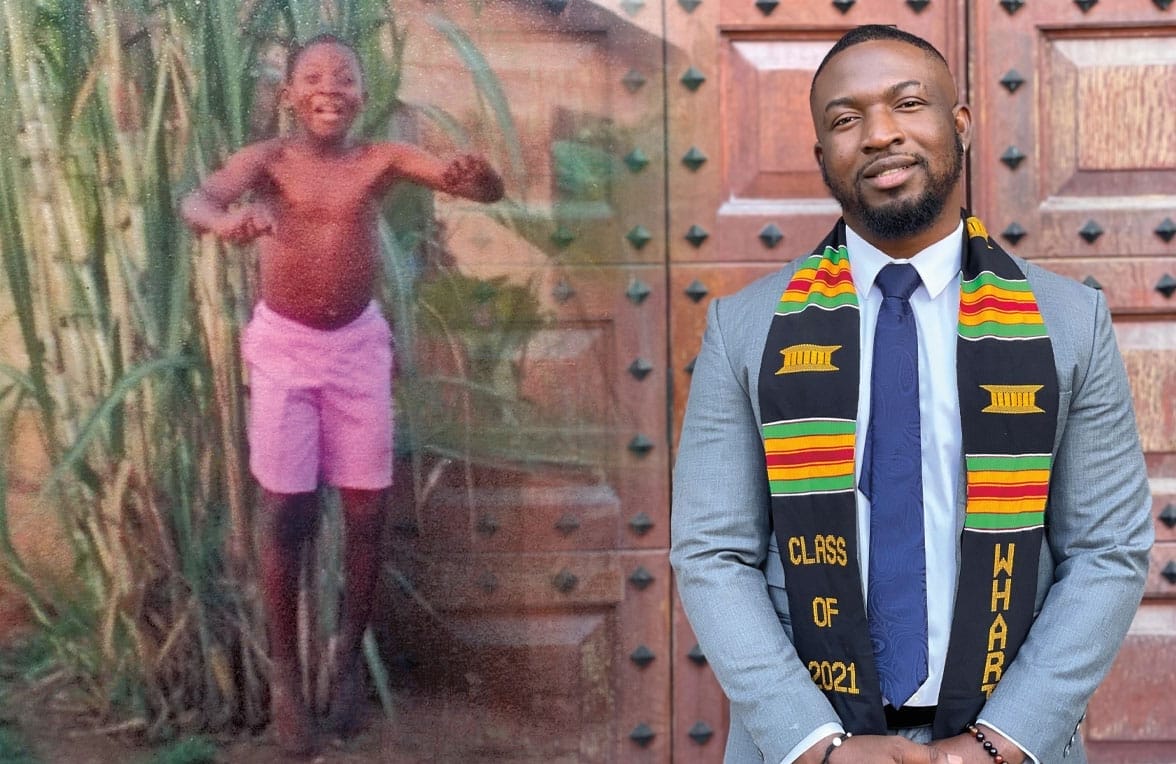When I was 13 years old, I told my dad I wanted to study aerospace engineering in America. I was standing in his room, brimming with excitement because I finally knew what I wanted to be when I grew up. He looked at me with worried eyes and said, “Tope, you’re dreaming too big. That’s just not feasible. Find something more attainable.” I was crushed and could not understand why he didn’t believe in me. Later, I realized that he was just trying to protect me. He didn’t want my dreams shattered in the face of reality.
That reality was poverty. Mine was the unlikeliest of journeys to Wharton. I was born and grew up in extreme poverty in Lagos, where the majority of residents live on less than $1 a day. People often talk about “the Africa they don’t show you,” but I grew up in the Africa they do show you. I was raised in a family where one meal each day was the norm and meat was a luxury. I remember jumping fences with my siblings on more than one occasion to “borrow” food from the neighbor’s farm so we wouldn’t starve.
The limit that poverty placed on me wasn’t just financial; it was also a limit of ambition. Most of my friends didn’t finish high school, let alone talk of going to college. They were just as smart and hardworking, but the odds were against us. There is such a thing as being too poor to even dream.

Temitope Bookshop, which the author’s mother named after him
My parents got divorced when I was nine. That summer, I lived alone with my father. He worked long hours, and I spent my evenings waiting for him to come home. In his absence, I had to grow up quickly and care for myself. I learned discipline, self-motivation, and how to fix things around the house, like the small electric generator. This was where my love for engineering began. In those days, I still visited my mom’s bookstore, which she lovingly named after me. Those books were all that kept me out of trouble, providing an escape from my grim reality and transporting me into worlds where limitations didn’t exist. My stomach was empty, but my mind was full of dreams.
At 14, I decided I was done with high school, took my exit exams early, and passed with flying colors. I was ready to make my dreams of studying aerospace engineering in America come true. I taught myself the SATs, wrote and edited my essays, and saved all the money I had to go to the cybercafe every day to fill out applications. I got a lot of rejections until I was finally accepted by Oklahoma State University. I took a job selling life insurance door-to-door so I could raise some money for my tuition and move to America. I was a painfully shy kid, yet every day I would wake up, put on my grossly oversized suit, and visit the rich neighborhoods and corporate offices to sell insurance. Every knock felt like torture, but I persevered, because I either stayed the course or stayed in Nigeria. The latter wasn’t an option.
I boarded a plane to America by myself when I was 16. It was the first time I or anyone in my family had been on a plane. I had no idea where I was going, but I knew what I was running from. I made it through college working odd jobs, wearing hand-me-downs from friends, and eating lots of ramen. There were many nights when I forced myself to sleep so I wouldn’t think about how hungry I was. It was hard, but I survived, graduated at 20 with my aerospace engineering degree, and landed my first job at Sheffield Aerospace. It took many years before the cycle of poverty was broken, but slowly and surely, it was.
A few years later, I decided I wanted to dream bigger and climb the corporate ladder, so I set my sights on an MBA, knowing that my mediocre GPA would make it difficult to get into a top school. I studied hard, got a great GMAT score, and got into Wharton. My time in Philadelphia was truly transformative. I was surrounded by some of the most ambitious people I’ve ever met, and my eyes were opened to opportunities I didn’t even know existed. Those worlds I read about as a child were made manifest.
It would be easy to end this as a self-made story, but I owe my success to those who lent a hand along the way: my mom, who literally sold everything and borrowed from everyone so that I could get a decent education. My entire community back home, who donated the little they had so I could buy my plane ticket to America. Ray Woody and Richard Hazelwood, great bosses who wrote me better recommendations for Wharton than I probably deserved. Esther Edoho, who edited all my MBA essays and lent me money for my outstanding OSU bill so I could get my undergraduate diploma and go to Wharton. And John Patience WG73, a man I’ve never met, who endowed my Wharton fellowship, making my MBA experience possible. I worked very hard, yes, but I couldn’t have done it without all these people, and so many more.
And the support didn’t stop there. I continue to find myself surrounded by people who lift me up and let me dream big — including my current boss, who heard my story and gave me a chance to grow into my investment analyst role. As I look to the future, I carry all these people in my heart, and I am determined to pay it forward to kids like me who need someone to believe in them.
Temitope Akande WG21 is an analyst at Alyeska Investment Group in Chicago.
Published as “Against All Odds” in the Spring/Summer 2024 issue of Wharton Magazine.
























